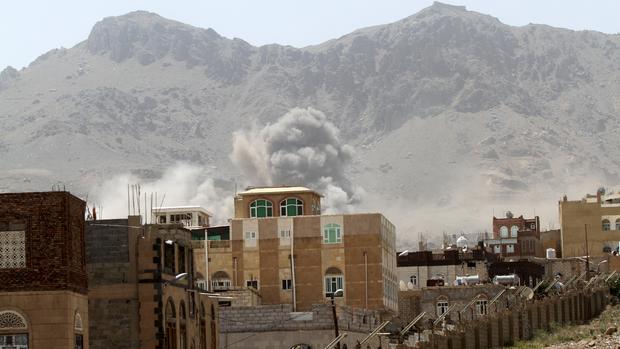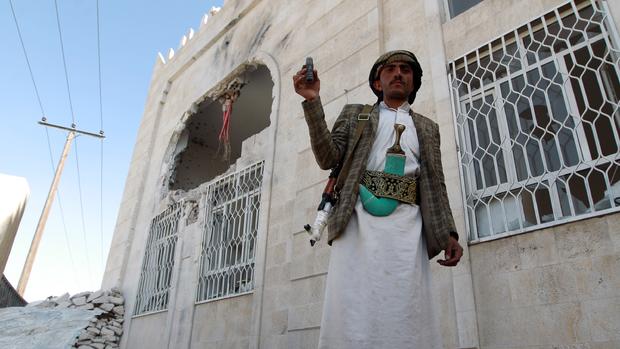Yemen capital sees heaviest airstrikes since truce expired
SANAA, Yemen -- The Saudi-led coalition carried out the heaviest airstrikes near the Yemeni capital since the expiration of a five-day truce with Yemen's Shiite rebels, hitting weapons depots in the mountains surrounding Sanaa and shaking several residential areas on Tuesday.
The bombardment began shortly after midnight Monday, with airstrikes targeting rebel-held military depots in the mountains of Fag Atan and Noqom, where missiles, tanks and artillery are kept, the residents said.
The Saudi-led coalition has repeatedly struck the two sites since launching the air campaign against the Iranian-backed rebels, known as Houthis, on March 26. But Tuesday's assault was the heaviest since the expiration of a five-day humanitarian truce in place last week, which was repeatedly violated.
Elsewhere in Yemen, missiles hit several Houthi positions in their stronghold in the northern province of Saada and Hajja, as well as gatherings of fighters allied with the Houthis in the city of Ibb, south of Sanaa, the western city of Taiz, southern city of Aden, near its airport, and in the eastern province of Marib.
Airstrikes also targeted the house of ousted President Ali Abdullah Saleh in the district of Sanhan, flattening it. Saleh's whereabouts are not known but his loyalists within the country's fragmented army have joined ranks with the Houthis. That alliance paved the way for the rebel takeover of the capital, Sanaa, last September and boosted the rebels' ability to advance into southern cities in an effort to expand their territorial gains.
In response to the latest airstrikes, the Houthis fired Katyusha rockets at the Saudi border region of Najran from rocket launchers in their stronghold of Saada on Tuesday, according to tribesmen in the region.
Late Monday, Houthi rebels also continued to blow up homes of rival politicians and security commanders in Yemen. In the latest in a string of detonations, the Houthis blew up the house of the newly appointed Chief of Staff Mohammed al-Maqdisi in the southwestern city of Dhamar, officials said.
The residents, tribesmen and Yemeni officials all spoke on condition of anonymity because of fear of reprisals by the Houthis.
The ground fighting did not stop even during the truce between the Houthis and fighters backing internationally-recognized President Abed-Rabbo Mansour Hadi, now in exile in the Saudi capital of Riyadh.
The Yemeni conflict has killed 1,820 people and wounded 7,330 since March 19, according to UN estimates. The estimates also show that nearly a half million people at least have been displaced in the period since the beginning of the fighting until May 7.
In a show of support to the Saudi-led operation, a gathering of dozens of Yemeni politicians and tribal figures ended in Riyadh on Tuesday with a declaration that called for the formation of special forces to protect Yemen's cities engulfed in the fighting.
The declaration also called for the formation of "safe zones" where "legitimate" Yemeni institutions could operate, though it gave no clear plan on how to set up such special forces or who would be responsible for the safe zones.
When they started on March 26, it was widely believed that the Saudi-led airstrikes would be followed by ground troops. However, almost two months into the campaign, there has been no sign of imminent deployment of ground forces.

